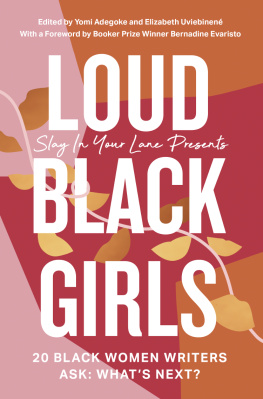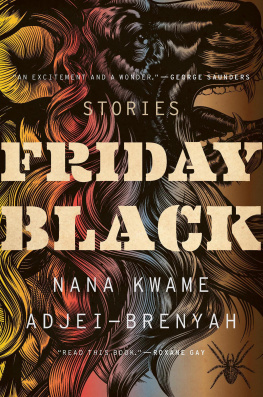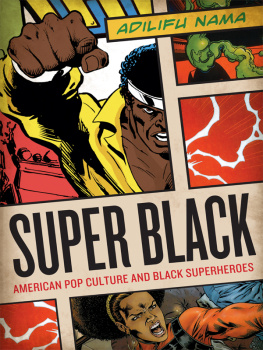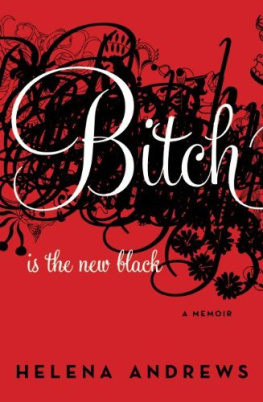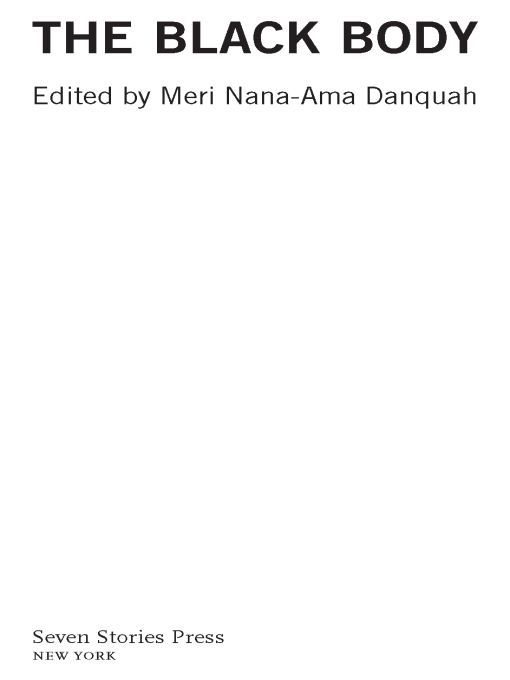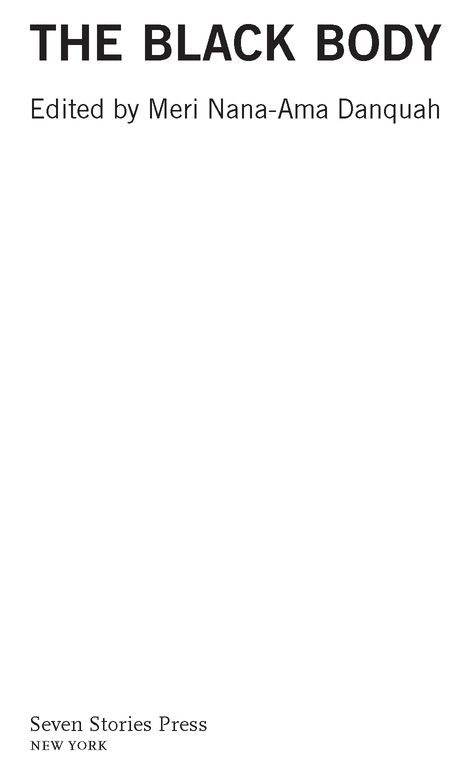Table of Contents
For
Mina and Caillou
may the tide
that is entering even now
the lip of our understanding
carry you out
beyond the face of fear
Lucille Clifton
ACKNOWLEDGMENTS
First and foremost, I would like to thank God for the miracles and blessings. I am deeply grateful for all the beauty and love that exist in my life, and for each day that I am able to wake up and experience it once more. Thank you, again and again, to Reverend Dr. Michael Bernard Beckwith, Rickie Byars Beckwith, Akili, Mama Alice, LaTerri and the entire community at the Agape International Spiritual Center for loving me, urging me forward and encouraging me to shine these past two decades.
I was in the middle of working on this book when my life suddenly came undone. I thank my family for welcoming my daughter, Korama, and me back home to Ghana with open arms, hearts and minds, especially Etwie Atta Akyea; Nana Addo Dankwa Akufo-Addo; Kwasi Twum; Hilda Danquah; George Brobby; Eric Fiifi Ofori-Atta; my mother, Josephine Danquah; Iris Asamoah; Dr. Charles Wereko-Brobby; Ken & Angie Ofori-Atta; J.B. Danquah Adu; Reks Brobby; Nana Asante Bediatuo; Frank Adu; Asare Gabby Otchere-Darko; Nana Yaw Kuntunkununku Ofori-Atta; the incomparable Nana Yaa Ofori-Atta; and, of course, the late great Ferdinand Ayim.
Many thanks to this books contributors for their patience and understanding and for writing with such grace, courage and honesty. I feel extremely honored to have been able to work with all of youparticularly Gail Wronsky, who was my ninth grade English teacher and who introduced me to a world of black literature I didnt even know existed.
My heart is filled with so much love for the friends who keep me laughing, talking, dreaming, and writing. Thank you: Annie Burrows, David Goldsmith, Michael Taylor, Andrew Solomon, CCH Pounder, Agyeman Ossei, Jamal Kadri, Jaime Pressly, Herman Chinery-Hesse, Kimball Stroud, Eric Burns, Ama Dadson, Komla Dumor, Anedra Shockley-Elsesser, Greg Tate, Bee-be Smith, Alhaji Aliu Mahama, Stephanie Covington Armstrong, Michael Blum, Anna Bossman, Sharla Crow, David Hatcher, Jonathan Burrows, Lisa Black-Cohen, George Koomson, Dianna Cohen, Frank Roman, John Dramani Mahama, Jackson Browne, Don Mensah, Hill Harper, Nnamdi Mowetta, my uncle Opoku Akyeampong, and my sister Paula Danquah-Fischer.
I am grateful to Ama Ata Aidoo, one of the African women writers upon whose shoulders I stand, and to the phenomenal poet, Kofi Awoonor, for their friendship and encouragement.
I am also grateful to: my uncle, Duke Danquah, for the many great conversations and Bloody Mary-soaked Sunday brunches at Sarabeths; William Assibey, Richard Druyeh, and Joe Nanor who so generously supplied bailout funds to help me keep the wolf away while I was writing; my father, N. Duke Brobby for his support; Cindy Spiegel for still believing in me; my lawyer Kenneth Burrows; Rick Solomon, for choosing me to mentor when he decided to give back; and my agent David Vigliano, for being exactly who he is and exactly what I needed.
In matters concerning publication, I would like to thank Wayne DeSelle for coming through on such short notice with our gorgeous cover design; Steven Malk and Simon Lipskar at Writers House for being so kind and attentive, and for rescuing this project. Likewise, I would like to thank Theresa Noll, Veronica Liu, Anna Lui, Ruth Weiner, Ashley Roberts, Lars Reilly, Jon Gilbert, and everyone at Seven Stories Press for taking such pride in the books that you produce, and for handling me and this project with such care and respect. I would especially like to express my gratitude to Dan Simon for daring, in a time of tremendous corporate greed, to create this independent publishing house and to keep its doors open and lights on month after month and year after year. Dan, I am just awed by your tireless efforts, your love of literature and your commitment to writers such as myself. Seven Stories Press really is like The Little Engine That Could, and you really are pretty amazing and inspiring. Thank you for giving this project a home.
Last but certainly not least, I would like to say thank you to my daughter, Korama Danquah, hot cocoa maker and rainbow keeper. A statement of fact: I love you more than I ever thought I could love anyone. You bring meaning to the whole journey, the whole experience, even the silliest parts; and you help me see things with new eyes. A question: Do u glass?
Yeah, thought so.
One likely reason for the paucity of critical material on this large and compelling subject is that, in matters of race, silence and evasion have historically ruled literary discourse.... It is further complicated by the fact that the habit of ignoring race is understood to be a graceful, even generous, liberal gesture. To notice is to recognize an already discredited difference. To enforce its invisibility through silence is to allow the black body a shadowless participation in the dominant cultural body.
Toni Morrison, Playing in the Dark: Whiteness and the
Literary Imagination
If this fire determined by the sun, be received on the blackest known bodies, its heat will be long retaind therein; and hence such bodies are the soonest and the strongest heated by the flame fire[.]... Let a piece of cloth be hung in the air, open to the sun, one part of it dyed black, another part of a white colour, others of scarlet, and diverse other colours; the black part will always be found to heat the most, and the quickest of all; and the others will each be found to heat more slowly, by how much they reflect the rays more strongly to the eye; thus the white will warm the slowest of them all, and next to that the red, and so of the rest in proportion, as their colour is brighter or weaker.
Hermann Boerhaave
A New Method of Chemistry, 2nd edition (1741)
INTRODUCTION
BODY LANGUAGE
The idea that eventually became this book was rooted in my fascination with the black body, which began when, at the age of six, I emigrated with my family from Ghana to America. I dont remember ever being aware of my blackness before then; I guess that was one of the privileges of living in a predominantly black country.
In America, it was the exact opposite. I was always keenly aware of my blackness nearly every second of every day, of how the adjective black suddenly seemed to precede every nominative description of meblack student; black girl; black friend. I even got into the habit of counting black bodiesin classrooms, on buses, at parks and beaches, wherever two or more were gathered. I dont know what the point of doing that was, what conclusions I expected to draw; I just know that I felt compelled to do it.
Back then, I hadnt formed any opinions or judgments about the black body. I was a child, a stranger in a strange land. What did I know of the history of the black body? I hadnt yet learned of chattel slavery, of the countless numbers of black bodiesAfricans, like methat had been brought to America. I hadnt yet learned of the chains and shackles, the brandings, the auction blocks, the plantations, the beatings and rapes. When I looked at a black body, what I saw was myself. It was an assurance that I would not disappear, that this sea of whiteness into which Id been submerged would not somehow swallow me.


